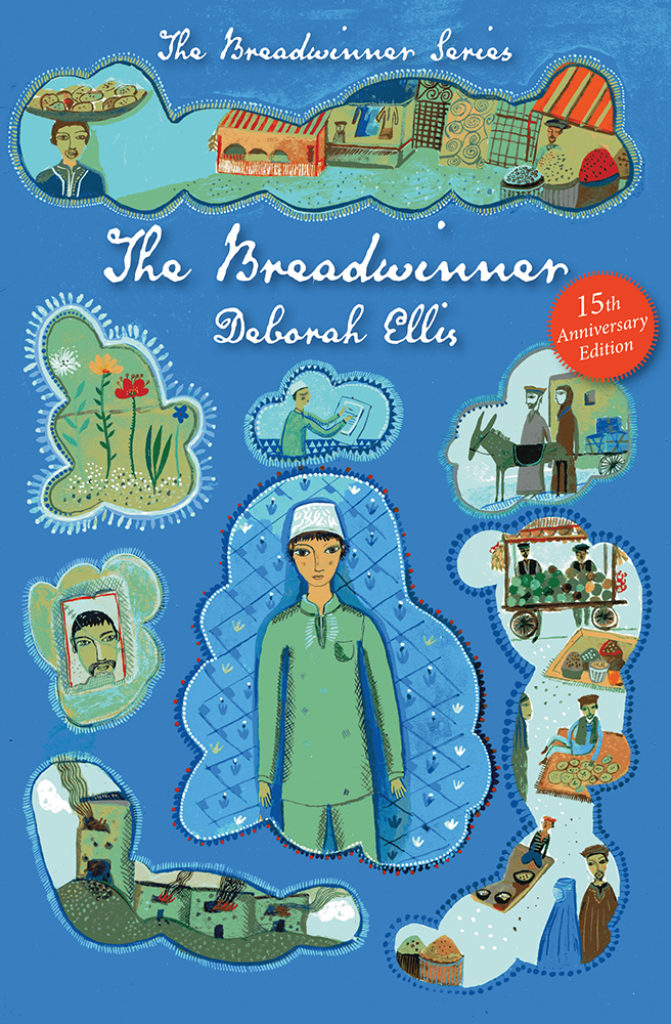The Breadwinner by Deborah Ellis has been reviewed by Focus on the Family’s marriage and parenting magazine. It is the first book in the “Breadwinner” series.

The Breadwinner by Deborah Ellis has been reviewed by Focus on the Family’s marriage and parenting magazine. It is the first book in the “Breadwinner” series.
Parvana is an 11-year-old girl living in war-torn Kabul, Afghanistan. Since the Taliban took over, life has been a struggle. Her whole family — parents, older sister, Nooria, and younger siblings, Maryam and Ali — has been forced to live in one room. She and Nooria, like all girls, are now forbidden to attend school.
Their mother is no longer allowed to be a writer for the local radio station. Father, who has a leg injury, makes a meager living for the family by selling items and translating letters in the marketplace. Parvana can only leave the house to help Father to and from the market, as women aren’t permitted in public without a male escort.
Father urges the girls to remain strong in the face of oppression. When Father is arrested for no apparent reason, the family is left without a provider or even a male old enough to purchase food and supplies. Parvana’s mother sinks into a depression and fails to take care of the family.
A neighbor named Mrs. Weera helps mother get back on her feet. Mother and Mrs. Weera decide Parvana must cut her hair and dress like a boy so she can support the family. They tell people Parvana is Father’s nephew, Kaseem.
As Kaseem, Parvana starts out selling the family’s goods in the marketplace. She also translates letters as her father had. Mrs. Weera moves in with them, and she and Mother start an underground magazine chronicling the oppressive Taliban rule in Kabul.
One day, Parvana sees an old classmate named Shauzia, who is also posing as a boy. The girls talk about how they’d like to purchase trays so they can sell their wares on the go. Shauzia learns of a way they can make fast money by digging up bones from a mass grave in the city. The job is gruesome, but they soon have enough money for their trays.
When they see activity at a stadium, they go inside hoping to sell their wares. Once inside, they realize in horror that this is no sporting event: Taliban soldiers are cutting off the hands of accused thieves to make an example of them. Parvana stays at home for several days after witnessing this display, unable to face the world.
Mother and Mrs. Weera start a secret school for girls where Nooria is the teacher. Nooria decides to marry a man she’s never met in hopes of getting an education and a better life. He lives in a town called Mazar, where the Taliban isn’t in control. Mother and the younger children make the long journey with her to her new home. Parvana remains in Kabul in case Father is released.
One night, Parvana hears a woman crying. She sneaks the woman, Homa, back to their house. Homa reports that the Taliban has just taken over her city — Mazar. She talks about seeing her family shot and watching as wild dogs ate human bodies in the street. The next day, two men bring Parvana’s frail father home. Parvana works in the market as Mrs. Weera helps Homa and Father recover.
Mrs. Weera, her granddaughter and Homa leave for Pakistan to start a school in a refugee camp. Parvana and Father head to Mazar in hopes of finding their family. Parvana says goodbye to Shauzia, who plans to leave the country with a band of nomads. The girls agree to meet on the top of the Eiffel Tower on the first day of spring in 20 years.
None
The Taliban militantly enforces its strict interpretation of Sharia law, their religious law, which forms part of the Islamic tradition. Taliban soldiers cut off men’s hands if they were accused of theft or other wrongdoing. Women must wear concealing burkas and are essentially under house arrest. They may not be educated and can’t be seen in public without a male chaperone. Ground floor windows must be painted black so women can’t be seen from the streets. Soldiers sometimes beat women.
Parvana’s parents are schooled people who prize education. Father encourages his girls to be brave in a time when women are being mistreated. Mother is grumpy and experiences bouts with depression, but she eventually begins writing again to help others understand the plight of the women in Kabul. Mrs. Weera helps Mother through her depression and becomes her partner in putting together a magazine. The ruling Taliban is cruel and unjust, particularly to women.
Parvana hears about wild dogs eating bodies of people the Taliban has shot. She watches as Taliban soldiers cut off men’s hands to make an example of their alleged thievery. Taliban soldiers beat and whip women. Mother tries to fight soldiers who are imprisoning Father, and they beat her.
None
Get free discussion questions for this book and others, at FocusOnTheFamily.com/discuss-books.
Historical information: This is a fiction book based on interviews the author did with people who lived through this crisis. It provides insight into the situation without delving into religious beliefs or traditions.
You can request a review of a title you can’t find at reviewrequests@family.org.
Book reviews cover the content, themes and worldviews of fiction books, not their literary merit, and equip parents to decide whether a book is appropriate for their children. The inclusion of a book’s review does not constitute an endorsement by Focus on the Family.